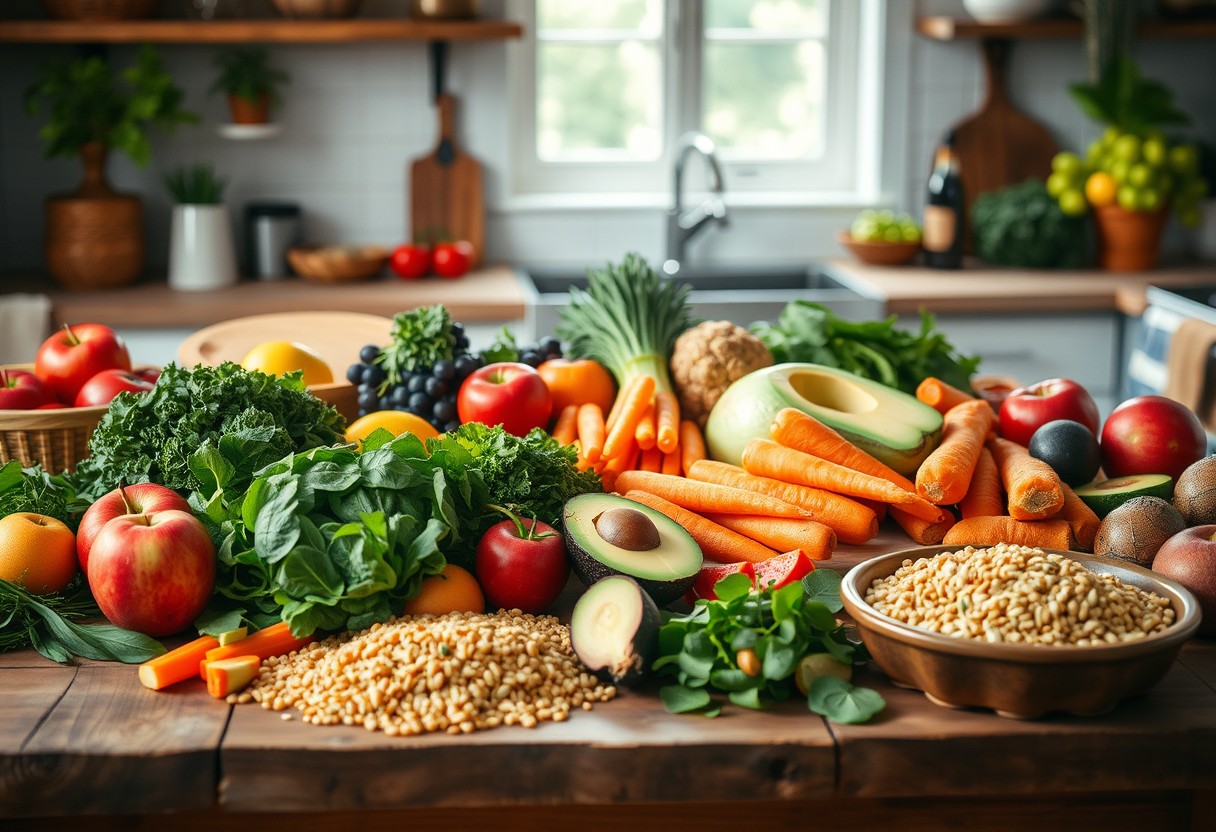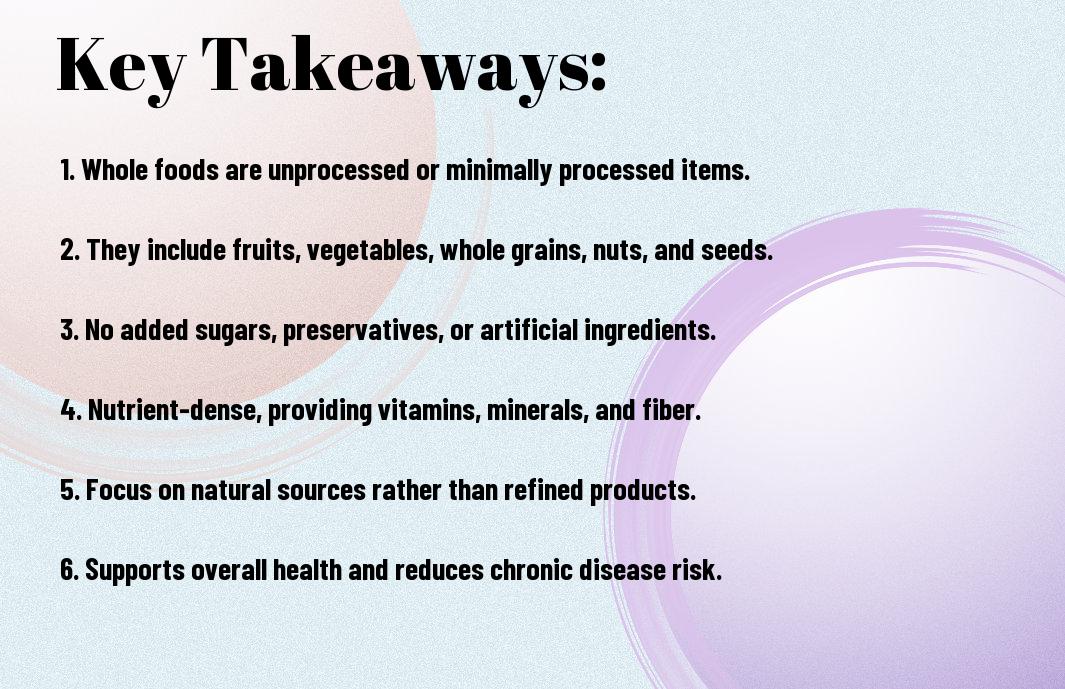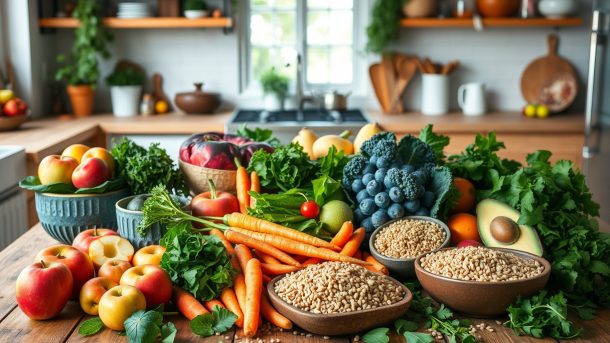Many people are curious about what defines a whole food and why it matters for your health. Whole foods are those that are minimally processed and free from artificial additives, providing you with crucial nutrients in their most natural state. By focusing on whole foods in your diet, you can enhance your overall well-being, support better digestion, and maintain a healthy weight. In this blog post, you will learn the key characteristics of whole foods and how they can positively impact your lifestyle.
Key Takeaways:
- Minimally Processed: Whole foods are foods that have undergone little to no processing, preserving their natural state and nutritional content.
- Natural Origin: They come from natural sources, such as plants and animals, and include fruits, vegetables, whole grains, nuts, seeds, and lean proteins.
- Nutrient-Dense: Whole foods are typically rich in imperative nutrients, providing vitamins, minerals, and fiber, which contribute to overall health and well-being.

Understanding Whole Foods
While navigating the world of nutrition, understanding what constitutes whole foods is imperative for making healthier choices. Whole foods are minimally processed and are typically free from additives, preservatives, and artificial ingredients. They retain the majority of their natural state and nutritional value, helping you fuel your body effectively.
Definition of Whole Foods
The definition of whole foods revolves around natural ingredients that have undergone little to no processing. These foods are often in their original form and provide the vital nutrients your body requires for optimum health.
Types of Whole Foods
Types of whole foods can generally be categorized into various groups that promote a balanced diet. Here’s a breakdown of some main categories:
| Type | Examples |
| Fruits | Apples, Bananas, Berries |
| Vegetables | Carrots, Spinach, Broccoli |
| Whole Grains | Brown Rice, Quinoa, Oats |
| Nuts and Seeds | Almonds, Chia Seeds, Walnuts |
| Legumes | Beans, Lentils, Peas |
For instance, when you choose whole foods over processed options, you are selecting items like fresh fruits, vegetables, whole grains, nuts, and legumes. Each category contributes unique nutrients and benefits to your diet, enhancing your overall health.
- Focusing on whole food options often leads to increased energy levels.
- They help improve digestive health due to their high fiber content.
- Whole foods can reduce the risk of chronic diseases.
- They promote healthy weight management through nutrient density.
- Perceiving whole foods as the foundation of your meals allows for greater health improvement.
Importantly, whole foods are integral to a balanced diet and contribute to long-term well-being. By incorporating more whole foods into your eating habits, you empower your body to thrive and maintain optimal health.
Nutritional Benefits
Now that you understand what whole foods are, it’s important to investigate into their nutritional benefits. Whole foods are packed with vital nutrients that support your overall health. They provide the proper balance of vitamins, minerals, and fiber crucial for maintaining optimal body function. For more insights, check out What is a whole-food, plant-based diet and why should you ….
Vitamins and Minerals
The nutritional profile of whole foods is one of their most significant benefits. They are rich in vital vitamins and minerals that play a vital role in bodily functions, from building strong bones to boosting your immune system. Incorporating a variety of these foods in your meals ensures you receive a comprehensive range of nutrients necessary for your well-being.
Fiber Content
Any discussion of whole foods must highlight their remarkable fiber content. Whole foods provide both soluble and insoluble fiber, which are vital for digestive health and can help you feel fuller longer. This can assist you in managing your weight and reducing the risk of chronic diseases.
Content from whole foods can significantly enhance your diet by improving digestion and promoting regular bowel movements. High-fiber options, such as fruits, vegetables, whole grains, and legumes, help regulate blood sugar levels and lower cholesterol. By consuming a fiber-rich diet, you support your gut health and ensure a more effective absorption of nutrients in your body.
Whole Foods vs. Processed Foods
For anyone looking to improve their diet, understanding the distinction between whole foods and processed foods is necessary. Whole foods are natural and unrefined, whereas processed foods have undergone various methods of alteration that strip them of their nutrients. If you’re curious about the differences between whole foods vs processed foods, you’re on the right track to making better food choices.
Differences in Nutritional Value
On average, whole foods offer a higher nutritional value compared to processed foods. Whole foods, such as fruits, vegetables, whole grains, and lean proteins, retain their necessary vitamins, minerals, and fiber. In contrast, processed foods often contain added sugars, unhealthy fats, and preservatives, leading to reduced nutrient density.
Impact on Health
For your overall health and well-being, the impact of food choices cannot be overstated. Consuming whole foods can enhance your health by promoting better digestion, stabilizing blood sugar levels, and reducing the risk of chronic diseases. On the other hand, a diet high in processed foods can lead to weight gain and increase the chances of developing conditions such as heart disease and diabetes.
Value the power of whole foods in your diet. By prioritizing these natural options, you support your body’s health through better nutrient absorption and fewer empty calories. Recall, the food you consume directly influences your energy levels, mood, and long-term health. Make conscious choices to embrace whole foods, and you’ll reap the benefits for years to come.
How to Incorporate Whole Foods into Your Diet
Not only can incorporating whole foods into your diet enhance your overall health, but it can also be a delicious and satisfying experience. Embracing these nutrient-rich options requires some thoughtful planning and smarter shopping choices.
Meal Planning Strategies
An effective way to ensure you’re eating more whole foods is to dedicate time to meal planning. Outline your meals for the week, focusing on including a variety of whole grains, fruits, vegetables, and lean proteins. This will help you stay organized and ensure you have all the necessary ingredients on hand, reducing the temptation to opt for less healthy choices.
Shopping Tips
An important aspect of incorporating whole foods into your diet is knowing how to navigate the grocery store. Start by making a shopping list that emphasizes whole foods, which will guide your selections and help you avoid the aisles filled with processed items. Prioritize shopping the perimeter of the store, where fresh produce, dairy, and meat are usually located. Any choices you make should focus on whole, unprocessed ingredients.
For instance, when shopping, consider the following tips to enhance your whole food intake:
- Choose seasonal fruits and vegetables for peak freshness and flavor.
- Opt for whole grains like quinoa, brown rice, or oats instead of refined options.
- Select items with minimal ingredients, ideally nothing artificial.
- Look for bulk bins for nuts, seeds, and grains to save money and reduce packaging waste.
- Buy from local farmers’ markets to support sustainable agriculture.
Any time spent learning about whole food shopping means a healthier diet for you.

Summing up
Drawing together the crucial components of whole foods, it’s important to recognize that these are minimally processed foods that retain their natural nutrients. You should look for items like fresh fruits and vegetables, whole grains, nuts, seeds, and legumes, as they provide the vitamins, minerals, and fiber your body needs. When you prioritize whole foods in your diet, you support better health and well-being, making informed choices for your nutrition and overall lifestyle.
FAQ
Q: What is considered a whole food?
A: Whole foods are foods that are in their most natural state, minimally processed, and free from artificial substances. This includes fruits, vegetables, whole grains, nuts, seeds, legumes, and animal products that are unprocessed or minimally processed.
Q: Are all unprocessed foods considered whole foods?
A: Not all unprocessed foods are considered whole foods. For instance, some foods may be unprocessed but still contain added sugars or preservatives. Whole foods are specifically those that are not only unprocessed but also do not contain any additives, maintaining their natural composition.
Q: Can you provide examples of whole foods?
A: Yes, examples of whole foods include fresh fruits like apples and bananas, vegetables like spinach and carrots, whole grains such as brown rice and quinoa, as well as nuts like almonds and walnuts. They also include legumes like lentils and chickpeas, and animal products like eggs and pure meats without additives.
Q: Is it important to include whole foods in my diet?
A: Yes, incorporating whole foods into your diet is important for optimal health. Whole foods are rich in necessary nutrients, fiber, and antioxidants, which can help improve digestion, provide sustained energy levels, and reduce the risk of chronic diseases.
Q: How can I identify whole foods when shopping?
A: To identify whole foods while shopping, look for items that have minimal ingredients, ideally just one. Choose fruits and vegetables that are fresh and seasonal, select whole grains like brown rice or oats without additives, and opt for meat and dairy products that are labeled as organic or grass-fed without added hormones or antibiotics.



